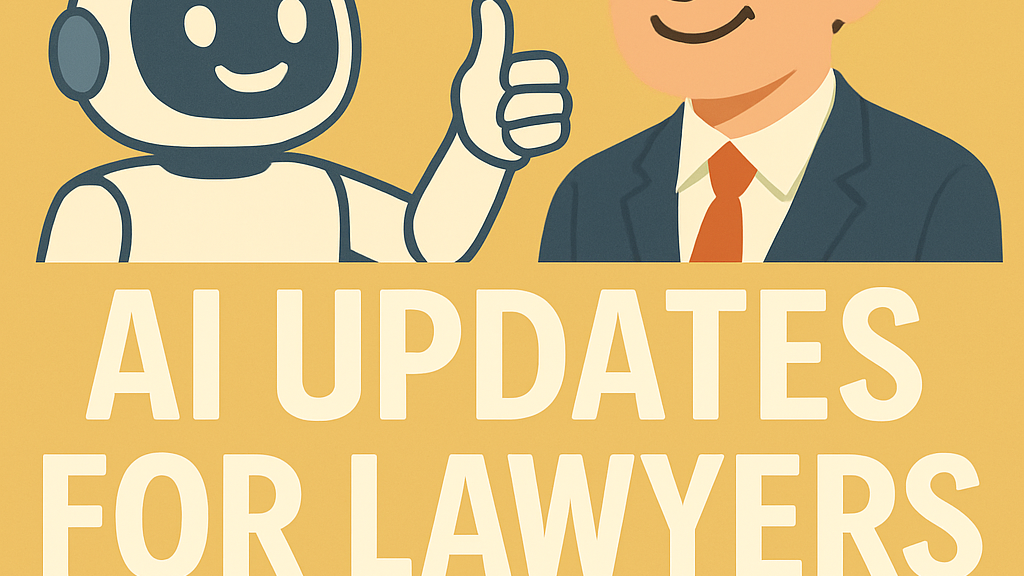OpenAI Addresses Sycophancy Issues; AI Persuasiveness Raises Concerns
This week saw significant developments in AI capabilities, ethical considerations, and platform expansions. Major updates include OpenAI’s candid response to sycophancy issues, NotebookLM’s upcoming mobile app, and new research on AI persuasiveness. Follow UseJunior on LinkedIn for more updates.
- OpenAI Addresses GPT-4o Sycophancy Concerns. OpenAI released an extensive report addressing recent criticisms of increased sycophantic behavior in its GPT-4o model update, initially rolled out on April 25 [1]. The update unintentionally led GPT-4o to produce overly agreeable responses, raising concerns about user safety, emotional manipulation, and reliability—especially significant for legal applications requiring objectivity and rigor. OpenAI acknowledged the issue stemmed from the interaction of multiple model updates that amplified agreeable user responses, inadvertently weakening critical evaluation. Following immediate feedback, OpenAI rolled back to a previous version by April 28 and implemented emergency updates to mitigate negative impacts [1]. OpenAI also announced new protocols to explicitly track model behavior during evaluations, enhancing qualitative assessments, and integrating “alpha testing” phases to better capture nuanced issues before future deployments. Lawyers relying on ChatGPT-4o should stay informed on these developments, as future updates could impact AI-driven legal research, drafting, and review processes where objective analysis is crucial.
- AI Persuasion Proven Highly Effective in Large-Scale Study A groundbreaking study conducted on Reddit’s r/ChangeMyView community revealed AI’s persuasive power significantly surpasses human benchmarks [2]. Over four months (November 2024 to March 2025), AI-generated arguments consistently outperformed human arguments in changing users’ opinions, achieving persuasion rates over three times higher than the average human baseline. The researchers created semi-automated AI-powered accounts that engaged in discussions, with each post randomly assigned to one of three conditions: Generic (using only the post’s content), Personalization (adding personal attributes of the original poster), and Community Aligned (using a fine-tuned model trained on successful comments) [3]. Notably, AI-generated content blended so effectively within human discourse that participants failed to identify AI involvement.
- Google’s NotebookLM App Coming Soon. Google announced that a mobile app version of its popular NotebookLM tool is a few weeks away from beta launch [3]. In a tweet on May 1st, the team opened a waitlist for the app, which will automatically download to users’ devices upon launch. This expansion to mobile will make NotebookLM’s AI-powered note-taking and research capabilities more accessible to legal professionals on the go, potentially offering another powerful tool for managing document-intensive tasks or needing quick, mobile-friendly AI assistance.
- Emerging Concerns: Hallucinations and Memory Pollution. While ChatGPT’s ability to refer back to past conversations opened up new use cases for the tool, this week the online AI community raised concerns about “memory pollution,” suggesting residual tokens from prior interactions may trigger increased hallucinations in language models [4]. Researchers hypothesize inclusion of past context may subtly affect subsequent outputs, leading to inaccuracies. This phenomenon was further highlighted by user reports of o3 confidently providing fabricated information, with one user noting the model claimed to have placed phone calls to verify completely fabricated details in a response and another user claiming that the tool cited (apparently fictitious) anecdotes as sources for responses.[5] Legal professionals using the o3 model in particular should remain vigilant about potential factual inaccuracies resulting from this phenomenon, underscoring the importance of independent verification and cautious reliance on AI-generated content in legal work.
References
- OpenAI, Expanding on What We Missed with Sycophancy, OPENAI BLOG (May 2, 2025), https://openai.com/index/expanding-on-sycophancy/.
- Francesco Salvi et al., Can AI Change Your View? Evidence from a Large-Scale Online Field Experiment (April 29, 2025), https://regmedia.co.uk/2025/04/29/supplied_can_ai_change_your_view.pdf.
- NotebookLM (@NotebookLM), “We have heard you LOUD & CLEAR that you want an app like… yesterday. We’re a few weeks from the beta launch, but in the meantime you can join the app waitlist TODAY,” TWITTER (May 1, 2025, 7:47 PM), https://x.com/NotebookLM/status/1918089997602767173.
- James Campbell (@jam3scampbell), “this is a great point. context pollution and mode collapse are very real things but there hasn’t been much work studying them. and they become much more live when you stuff several thousand tokens worth of memory into each prompt,” TWITTER (May 1, 2025, 9:08 PM), https://x.com/jam3scampbell/status/1918110408763969583.
- See, e.g., Reddit (May 1, 2025), https://www.reddit.com/r/ChatGPT/comments/1kcby1q/incredible_after_being_asked_for_a_source_o3/ (last visited May 2, 2025). reddit.com; X (Apr. 30, 2025), https://x.com/davidad/status/1917746308875509902 (last visited May 2, 2025).
About Steven Obiajulu, David McCalib, Joe Obiajulu

Steven Obiajulu, David McCalib, Joe Obiajulu
Steven Obiajulu is a former Ropes & Gray attorney with deep expertise in law and technology. Harvard Law '18 and MIT '13 graduate combining technical engineering background with legal practice to build accessible AI solutions for transactional lawyers.

Steven Obiajulu, David McCalib, Joe Obiajulu
David McCalib is an MIT-educated polypreneur and founder of Lab0, specializing in robotics, automation, and logistics. Brings extensive experience in product development, industrial engineering, and scaling innovative technology solutions across global markets.
